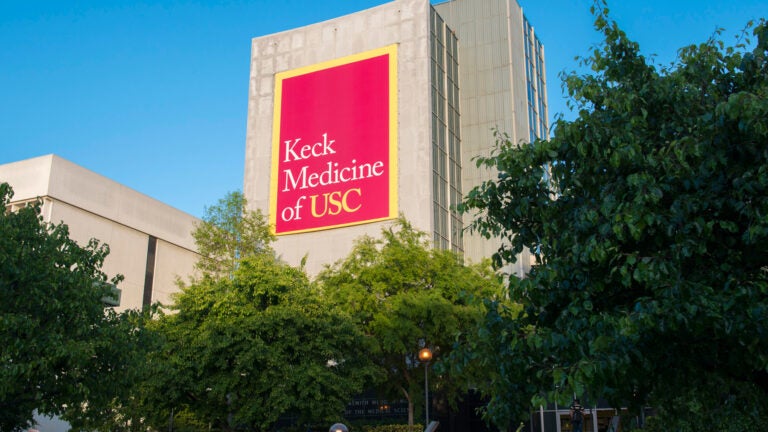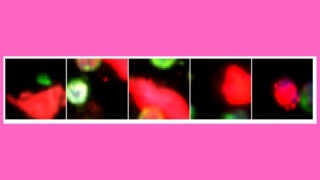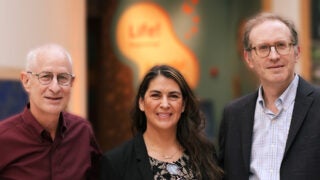
The six gifts were collectively worth nearly $125 million in the 2014-15 fiscal year. (Photo/Chris Shinn)
Keck School of Medicine momentum fueled by nearly $200 million in gifts
Six major gifts support USC’s medical education, research and patient care efforts, from fighting leukemia to improving hearing to mapping the brain
The Keck School of Medicine of USC has marked its most successful year of fundraising since 2011, raising almost $200 million and receiving six major gifts collectively worth nearly $125 million in the 2014-15 fiscal year. Overall, nearly 52,000 donors to the medical school have contributed $835 million, pushing the $1.5 billion Keck Medicine Initiative more than halfway to its goal as part of the $6 billion Campaign for the University of Southern California.
The campaign is an ambitious effort to fund academic priorities and expand the university’s impact on the community and world.
The extraordinary generosity of these individual, family and foundation donors to the Keck School of Medicine has spurred the university’s contributions to a global health revolution now transforming the practice of medicine.
Gifts support a wide range of USC’s medical education, research and patient care efforts, from fighting leukemia to improving hearing to mapping the brain. As part of the Campaign for USC, the Keck Medicine Initiative aims to improve the quality of life of people in Southern California and around the world by bringing cutting-edge science and medicine together.
These six major gifts, along with the collective contributions of so many other donors, are a concrete endorsement of the vision for USC.
Carmen A. Puliafito
“These six major gifts, along with the collective contributions of so many other donors, are a concrete endorsement of the vision for USC to invest in the promise and potential of biomedical research,” said Carmen A. Puliafito, dean of the Keck School of Medicine. “Through their philanthropy, all of our donors help us to advance our tri-part mission: providing the best in patient care, finding new treatments and cures for disease and educating the next generation of physicians.”
Understanding the brain
One of the major centers endowed is the USC Mark and Mary Stevens Neuroimaging and Informatics Institute. It brings together scientists from around the world to further understanding of the brain. Longtime benefactors Mark and Mary Stevens’ $50 million gift will accelerate the institute’s already dramatic progress toward mapping the healthy brain and illuminating neurologic diseases such as Alzheimer’s and schizophrenia. Mark Stevens ’81, MS ’84 is a USC alumnus and member of the USC Board of Trustees and the USC Health System Board. The Stevenses are among the university’s most generous donors.
Another gift recognized the school’s fast-growing program of clinical expertise and research of ear, nose, throat and related diseases of the head and neck. The Caruso Family Foundation’s transformational gift of $25 million will endow and name the USC Caruso Department of Otolaryngology-Head and Neck Surgery. Of this endowment, $5 million will help diagnose, test and treat hearing-impaired children through the USC Caruso Family Center for Childhood Communication. Rick Caruso ’80, founder and CEO of Caruso Affiliated, is a member of the USC Board of Trustees.
Donors’ giving also provided significant support to cancer research. Entrepreneur and industrialist Norbert Gehr lost his battle with leukemia in March, but his family foundation’s $20 million gift to support USC Norris Comprehensive Cancer Center will help others fighting the disease.
The funding advances research into diseases that precede leukemia, such as myelodysplastic syndromes and myeloproliferative neoplasms, as well as for acute myeloid leukemia. Gehr, founder and CEO of The Gehr Group, was a longtime patient of Keck School of Medicine hematologists Donald Feinstein and Casey O’Connell, as well as David Goldstein, associate professor of medicine and chief of the Division of Geriatric, Hospital, Palliative & General Internal Medicine.
Faculty contribute, too
While alumni have made big contributions to the Keck School of Medicine’s initiatives, so have faculty. The late Norman Levan MD ’40, USC professor emeritus and former chief of the Department of Dermatology, led the way among faculty donors. His $12 million bequest to USC, announced in May, will fund scholarships and an endowed chair in medical ethics.
Levan created the medical school’s first class in bioethics, which led to required ethics classes for medical students. An alumnus who graduated from the medical school in 1940, Levan supported USC for decades. His gifts to the university, including this bequest, total $20 million.
Another transformative gift came from the Stephenson family: husband-and-wife entrepreneurs and investors Emmet and Toni Stephenson and their daughter, Tessa Stephenson Brand ’02.
The Stephensons’ $10 million gift establishes the Stephenson Family Personalized Medicine Center at the Center for Applied Molecular Medicine at the Keck School of Medicine. The center will be a focal point for applying new technologies toward creation of a whole new classification system for cancer based on the biology of a tumor and the cellular microenvironment surrounding it — instead of the location where a tumor begins. Inspired by the personalized and experimental treatment of Toni Stephenson’s lymphoma, the family’s gift backs the work of David Agus, a professor of medicine and engineering at USC, and one of the world’s leading cancer doctors and pioneering biomedical researchers.
Finally, a $7.5 million gift from the Hastings Foundation establishes the new Hastings Center for Pulmonary Research. The center will advance research on lung injury, repair and regeneration to discover new treatments and cures for pulmonary diseases such as cystic fibrosis and chronic obstructive pulmonary disease. The Hastings Foundation has a long history of supporting research and programs at USC, providing more than $30 million to the university since 1975.



